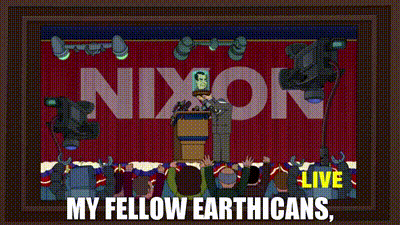I saw this circulating around and thought it was an interesting read.
Some of these are horrendous, some are funny, and a few made me think “Hmm, maybe not a bad idea”
A limit of $1 million in 1933 inflation adjusted would be $24.4 million today.
How would that work with inflation / deflation I wonder, you hit the limit, can’t make anymore, you retire, all is well. Then what, you need to get rid of 5% of your wealth? How do you define the limit, dollars in X year? Why that arbitrary amount?
A progressive wealth tax with the final bracket being 100% at $24.4 million.
I seriously support this
We make minimum wage an arbitrary amount untied to inflation. This would be the same.
Tie it to inflation, set the number high enough to maintain an upscale property and life for 100 years (that way babies inheriting money won’t suffer), and enforce it via military strikes on offenders and their families.
I love that amendment, and have wanted it to exist for years. Nice to see I’m not the only person to come up with it.
The inflation calculators you use are wrong.
$1 million in 1933 would buy you several mansions, a fleet of cars, a couple of aeroplanes, and you’d have enough left over to provide you’re grandchildren with trust funds.
So, you believe everything the government tells you?
The statistic I like to cite [because it’s pretty simple to remember] is that the minimum wage in 1960 was $1.00/hour and the cost of the average home was $11,000.00
So, you believe everything the government tells you?
Lazy argument is lazy. If you have an issue with how inflation is calculated, why are you keeping us in the dark? Tell us what it is.
The statistic I like to cite [because it’s pretty simple to remember] is that the minimum wage in 1960 was $1.00/hour and the cost of the average home was $11,000.00
The reason this doesn’t constitute inflation is that most people don’t work for minimum wage, and they buy more than just homes. So trying to work out inflation (the relative value of money over time) requires a slightly broader lens.
Except that I’m not focusing on “inflation.” I’m concerned with the ever widening gap between the rich and the poor. And by the “poor” I mean the 99%.
Look at the 1960 figures. That meant that a high school graduate with no particular skills could live a pretty good life and support a family working 40 hours a week. Today it’s common to require two incomes to keep a family going.
You:
The inflation calculators you use are wrong
Also you:
Except that I’m not focusing on “inflation.”
Look at the 1960 figures. That meant that a high school graduate with no particular skills could live a pretty good life and support a family working 40 hours a week. Today it’s common to require two incomes to keep a family going.
Cool, but it’s helpful to state your premises up front. That situation was viable well into the 70s, after which Reagan-era policies completely decoupled real income from productivity, and started to fall apart. By the mid 90s it was all but gone.
You’re completely correct in the figure for federal minimum wage and average home cost, but that doesn’t mean these two figures are relevant. Let me explain.
Let’s take a look at the federal minimum wage, in 1960, $1/hr, now in 2024, $7.25/hr; 7.25 times higher. Let’s look at the national average cost of a home, in 1960, ~$11,000, now in 2024, ~$320,000; 29 times higher.
Does this mean that the government is lying about historic wages or housing costs since they both didn’t increase at the same rate? No.
Wages have notoriously not kept pace with inflation, while housing is considered a stable asset for building generational wealth, outpacing inflation. It can be a hard concept to grasp, but the value of a dollar is much more complex than being directly tied to minimum wage or cost of housing.
You just proved my original argument.
Go back to “$1 million in 1933 is the same as $24 million in 2024.”
We both realize that for an individual the $1 million in 1933 is much greater wealth than $24 million in 2024.
The only difference is that I am focusing on the individual’s relationship with a dollar and you are taking the larger view.
Not quite. The point I was trying to make was that wages/housing are not necessarily tied inflation i.e. the change in the overall effective value of a dollar. Let’s see if we can try to agree on a few points. The effective value of the dollar is not stagnant. It changes each year. The fed tries to ensure inflation rather than deflation to encourage investing/spending of money. As such, the rate at which more money is minted each year and federal rates are controlled to try to hit a healthy amount of inflation each year. Now, if we were to take the average percent of inflation each year between now and 1933, the value of today’s dollars would be roughly (today’s dollar value)=(1933’s dollar value)×[1 + (average inflation rate)]^(2024-1933).
Do we agree on the above but just disagree on what the average inflation rate would be? Or is something above incorrect?
The only difference is that I am focusing on the individual’s relationship with a dollar and you are taking the larger view.
My one and only point is that if someone who had a million in 1933 came to the future and saw what $24 million would buy he’d be outraged.
The official figures are fine if you’re talking statistics; they fail when you apply them to the real world.
I think we can all agree on that point.
That 1876 session sounds lit
We should revisit those. The senate thing could be moderated with each state getting an extra two representatives. I’d add to the “no religious leader can hold office” one that churches are no longer tax-exempt by default, they can file as a 501©3 like every other charitable organization and show the community work they’re doing.
Some of these are bangers but others are utterly deplorable.
United States of Earth is hilarious

Arooo.
Thinking way down the road
USE! USE!
As a layperson who hasn’t given it too much thought, the 1916 sounds interesting. I assume they’d only use a small percentage of volunteers since having 200 million new soldiers would be a bit unmanageable. The pessimist in me thinks they’d just do “military exercises” and never actually go to war and a vote though 😔
Registering to volunteer would basically be the same as the current requirement to register for selective service (the draft). It doesn’t mean they need to immediately start serving, just that they need to volunteer and serve when needed.
“Don’t cast the vote unless you’re on the boat”.
As former infantry, I complete approve.
But as someone involved in a large group that does a lot of peacekeeping, I think our obligation to the UN is important and needs to be stepped-up to give the UN some teeth.
Interesting yes, but also idiotic.
I propose the following law: whether or not the country should have sewage should be put to vote, and all those who vote yes shall be employed as sewage workers.
Or even the opposite: whether or not the country should treat the sick should be put to vote, and all those who vote yes will be signed up for medical school.
Now do you want to have no hospitals, do you want to be a doctor, or are you open to the idea that there may be people professionally in the service of the public and the public may have an opinion and possibly a say on how and when those professionals should be used?
I think this thought experiment is only around voting on things that would cause harm to citizens. If you’re willing to vote to send people to their death, you’d better be willing to join the list.
Like people frequently say representatives who vote against health care coverage for all should have their coverage taken away and they solely rely on private as well
Plenty of things cause harm to citizens. Somebody has to weld, somebody has to produce paints and batteries, the list goes on. All these things - including a standing army - are useful for the public, and it’s important to have professionals who handle it without forcing anybody who likes these things to volunteer to do them.
In the west we generally have professional armies, made of volunteer soldiers who chose to be sent wherever the country’s administration deems appropriate - and in working democracies the administration makes their decisions according to the popular will. If a foreign entity is posing a material threat I am very much free to think and express my opinion that we should let our professionals handle it, this is how things work in the present. To suggest that I should be enlisting because of this opinion is moronic.
Not that it’s any less moronic to suggest that military endeavours should be decided by popular vote: in representative democracy we vote people who we deem competent to form governments to run our countries, I certainly don’t think I can handle military affairs better than the ministry of defence. Direct democracy in general is a horrible idea, it’s not implemented anywhere relevant for good reason. But I digress.
The point is: the idea of “if you want the country to do it you should do it” is stupid and reeks of demagoguery.
anybody who likes these things to volunteer to do them.
If you like guns, then you need to be on the boat. This wasn’t only true of people when I served, but culling our violent people by sending them where they’ve romanticized their involvement and (tell everyone) they dream of going satisfies that money/mouth issue and reminds them this isn’t homeroom any more.
Voting to provide beneficial things like sewage and medicine aren’t warhawk problems, so much as they are a hallmark to basic society. Don’t conflate "killing in the name of " with fucking “do no harm”.
This was an interesting comment that’s opened my mind a little, so thanks for that.
How about: “conscripts can only be sourced from those who voted yes”?
Voting should always be anonymous. Otherwise it doesn’t take much for strength of arms to influence a vote. The second a vote isn’t anonymous, the data will be put on some computer, which means it can be hacked and stolen, then distributed.
Imagine living in a place that had a 90% vote on one side and you voted on the other side. The next vote could mean your life.
Why are we talking about conscripts? Modern (western) militaries have largely phased out conscription, and in case of war it’s extremely unlikely that you or I would be given a rifle and sent anywhere.
This is not to say we are (or should feel) extraneous from our armies, they are our means of protection and should be used wisely - just that arguments that involve regular people getting “picked up” don’t have any place in places like USA or Western Europe.
I don’t know where you are from, naturally things change in different situations - but the context here was a proposition for the American constitution.
America still has the draft and requires every male citizen 18 years or older to sign up for it. This amendment would change the requirement from every male citizen 18 years or older to every citizen who voted to go to war.
There’s a word for people who want other people to be sent out to fight on their behalf but aren’t willing to put their own lives on the line: chickenhawk.
Difference being that the military, and particularly infantry, is legit the only job where it’s acceptable for you to return home in a body bag.
In 1916, maybe it would’ve been a different story, but these days, I don’t understand it. I honestly don’t see how any millennial, gen X, or boomer veteran can be proud of their service or what they offered to the country. They should be pissed the fuck off. They didn’t serve to defend our country. They served as a human shield to corporate profits.
They put their lives on the line for a paltry salary, and more recently an education. Which itself is fucking bullshit. I mean, nothing against those who served for the GI bill. Good for you. But it’s fucked up that it came to that, given how much a college education costs the rest of the western world.
1933 :(
Right? How different would things look today?
It would be common knowledge that deflation is good solely because it benefits those at $1mil
But people having just one million wouldn’t wield incredible political power, so the government probably wouldn’t listen to them as much as they do now.
If I someone hits the $1 mark, they would probably be able to spend/transfer the excess to their children and relatives, and all kinds of shenanigans. It isn’t a terrible idea, but it would require some complex regulations to avoid it being yet another way for the wealthy to spend money to influence things.
High tax rates had the same intended outcome by encouraging them to keep their money in growing businesses and employees reaped the benefits in the 50s and 60s.
to spend/transfer the excess to their children and relatives, and all kinds of shenanigans
Sharing wealth to people who might also do the same once they end up millionaire? Doesn’t sound too bad, especially if any of those wealth transfers were taxed even slightly.
Honestly, there’s nothing wrong with the current system we have except for letting the rich people keep pretty much everything.
Imbalanced game state, rich people OP. Nerf that and shit will be gucci
Higher taxes on high incomes and wealth is better though.
Depends on how much they could change before it was passed an enacted. If they could restrict the national money supply to like $1, then $1mil cap would be no different than if we passed a $240,000,000,000,000,000,000 cap today.
I think you know “restricting national money supply to like 1$” isn’t realistic in any sense.
Economics have to work in practice, it’s not just pure math.
There would need to be an economy, so the minimum amount of money for that economy to work would obviously be more than 1$.
Even during the great depression the US GDP was hundreds of billions.
You could always just make something below cents and make 1 cent = 1 billion of that thing. So $1 would be equivalent to like 10 billion dollars. Granted, somehow you’d have to invalidate existing currency and push that type of policy in a political environment that is able to pass a constitutional amendment to prevent wealth accumulation. So, it couldn’t possibly be that extreme.
Like you say, you’d need to completely rehaul the entire existing currency.
I think you know that’s not reasonable.
Not much, rich people are usually smart enough to go around this sort of stuff. This is the company yacht, this penthouse is my office I just happen to live in, I am akshually a cayman citizen, etc etc.
Plus wealthy people usually don’t have a lot of cash, because keeping cash means losing money to inflation - I bet a lot of billionaires don’t have one million dollars in the bank even now.
I like the 1916 one. A lot, actually.
Shouldn’t be an amendment, but we should impose a “securities” tax to achieve something like the $1 million limit on personal wealth.
An annual, 1% tax on stocks, bonds, mutual funds, and other financial instruments, payable in shares of that security. (Which will then be slowly liquidated on the open market, such that the liquidated shares never comprise more than 1% of traded volume in any given time period)
The first $10 million directly held by a natural person are exempt from this tax.
Wealth isn’t problematic in and of itself. The issue is when wealth is used primarily to purchase wealth-generating assets, rather than the products and services that generate wealth for workers.
No make it an amendment so the rich who want to be richer have a much harder time abolishing it. And since you can’t stop the worst people from getting rich, it’s better to do an across the board blanket ceiling. If you can’t control the assholes, you have to say least throttle them.

I’m guessing the Council of Three got shot down because the office of the President shouldn’t be that powerful anyway. And yet we slowly made it that way.
The office of the president is so powerful because congress keeps passing more and more responsibility to the office.
Congress is supposed to declare war, but they give the president a bunch of limited power and follow their lead when it comes to military actions.
Congress is supposed to create the budget, but they start with a proposed budget from the president.
Congress is supposed to be the ones leading legislative change in general, but they defer most of that to the president.
etc.
Adding to this, I surmise that the inevitable comparisons to the triumvirates of republican Rome would not have gone over very well. I wonder if that was brought up at all when it was brought to the floor for discussion.
Take a look at switzerland to see how this could turn out :) (obligatory swiss patriotism)
2nd and 3rd and last all sound top-notch.
1893 and 1933 sound so coool
No army, no too rich people
Based Based Based Cringe Based Cringe Cringe Cringe Based (lol) Based Based Cringe Cringe Cringe Based
No senate? and deconstructing the US Military before the World War Era? What?
I don’t know about the second one - people shouldn’t be discriminated based on religion, so is it really right to discriminate against “religious leaders”? That goes a step beyond separating religion from law and into hindering people based on their beliefs.
1948 isn’t a bad one, but you have to accept being relocated to a shitty reservation. A Christian Nationalist lunatic reservation would make everything so much better for the rest of us.











